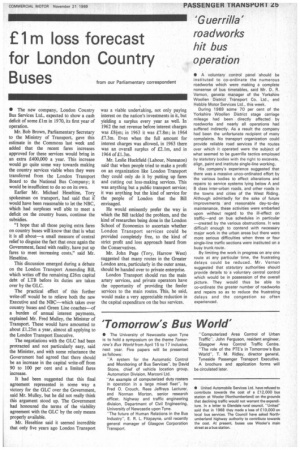Elm loss forecast for London Country
Page 27

If you've noticed an error in this article please click here to report it so we can fix it.
Buses from our Parliamentary correspondent
• The new company, London Country Bus Services Ltd., expected to show a cash deficit of some £ 1m in 1970, its first year of operation.
Mr. Bob Brown, Parliamentary Secretary to the Ministry of Transport, gave this estimate in the Commons last week and added that the recent fares increases approved for these services would bring in an extra £400,000 a year. This increase would go quite some way towards making the country services viable when they were transferred from the London Transport Board to the National Bus Company; it would be insufficient to do so on its own.
Earlier Mr. Michael Heseltine, Tory spokesman on transport, had said that it would have been reasonable to let the NBC, which had surpluses well able to meet a deficit on the country buses, continue the subsidies.
"I hope that all those paying extra fares on country buses will know that that is what it is all about—a small measure of central relief to disguise the fact that once again the Government, faced with reality, have put up fares to meet increasing costs," said Mr. Heseltine.
This discussion emerged during a debate on the London Transport Amending Bill, which writes off the remaining £26m capital debt of LTB before its duties are taken over by the GLC.
The practical effect of this further write-off would be to relieve both the new Executive and the NBC—which takes over country buses and Green Line coaches—of a burden of annual interest payments, explained Mr. Fred Malley, the Minister of Transport. These would have amounted to about £1.25m a year, almost all applying to the London Transport Executive.
The negotiations with the GLC had been protracted and not particularly easy, said the Minister, and with some reluctance the Government had agreed that there should be an increase in the capital write-off from 90 to 100 per cent and a limited fares increase.
It had been suggested that this final agreement represented in some way a victory for the GLC over the Government, said Mr. Mulley, but he did not really think this argument stood up. The Government had honoured the terms of the viability agreement with the GLC by the only means properly available.
Mr. Heseltine said it seemed incredible that only five years ago London Transport was a viable undertaking, not only paying interest on the nation's investments in it, but yielding a surplus every year as well. In 1962 the net revenue before interest charges was £81-m; in 1963 it was £7.8m; in 1964 £7.3m. Even when the full amount for interest charges was allowed, in 1963 there was an overall surplus of £2.1m, and in 1964 of £1.3m.
Mr. Leslie Huckfield (Labour, Nuneaton) said that when people tried to make a profit on an organization like London Transport they could only do it by putting up fares and cutting out loss-making services. This was anything but a public transport service; it was anything but the kind of service for the people of London that the Bill envisaged.
He would eminently prefer the way in which the Bill tackled the problem, and the kind of researches being done in the London School of Economics to ascertain whether London Transport services could be provided completely free, to the kind of strict profit and loss approach heard from the Conservatives.
Mr. John Page (Tory, Harrow West) suggested that many routes in the Greater London area, particularly in the outer areas, should be handed over to private enterprise.
London Transport should run the main artery services, and private operators have the opportunity of providing the feeder services to the main routes. This, he said, would make a very appreciable reduction in the capital expenditure on the bus services.




































































































